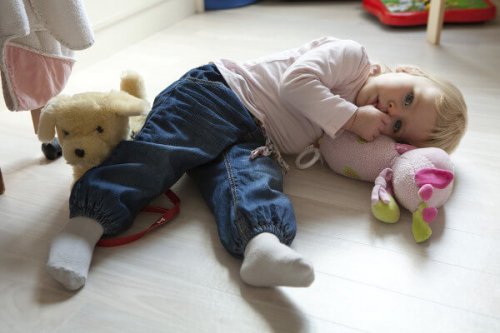Could Thumb-Sucking Be Good For Your Child's Health?


Written and verified by the professional writer and specialist in physical education Eva Maria Rodriguez Diego
Thumb-sucking is a habit that children should leave behind as they grow older, to avoid problems such as palate defects. However, a new study has found that this habit has an unexpected benefit.
Children who suck their thumb or bite their nails are less likely to develop allergies as they grow older.
The researchers behind the study suggest that thumb-sucking and nail-biting are likely to expose children to more microbes. This alters their immune system, and make them less prone to allergies.
The study was carried out by researchers from the University of Otago in Dunedin, New Zealand, and appears in the journal Pediatrics.
Results Support the Hygiene Hypothesis
The research used data from a long-term, multidisciplinary study which followed over 1000 people. The researchers used skin-prick tests on the participants when they were 13 years old, and again at age 32.
This test gives a positive result if the skin is sensitive to at least one common allergen. The result shows that the person has a higher risk of developing an allergy to the source of that allergen. These can include cats, dogs, horses, grass, house dust mites, fungi, etc.

The results at age 13 showed that only 38 percent of the participants who had sucked their thumb or bitten their nails tested positive for at least one allergen. Among participants who did not have either of these habits in childhood, 49 percent tested positive.
The results were even more striking for those who had bitten their nails or sucked their thumb frequently as infants. Only 31 percent of these participants had a positive result to the skin prick test.
This relationship became even stronger at 32 years of age, particularly when researchers accounted for other factors that could influence allergies, such as sex, family history of allergies, having a childhood pet, smoking habits and breastfeeding.
Given these findings, it seems that these habits are not something to be concerned about in young children, from the point of view of hygiene at least.
According to the researchers, the results support the hygiene hypothesis, which suggests that exposure to microbes during childhood reduces the risk of developing allergies.

Childhood habits to leave behind
Even though they may help to prevent allergies, children who suck their thumb or bite their nails should try to give up the habit. These may lead to major consequences.
Even though it is normal for babies to suck their thumb, if this habit continues after three years of age it can lead to deformations of the palate. This can cause multiple issues, such as problems with phonetics when the child begins to speak. Facial malformations are also a possibility, along with eating difficulties.
Additionally, it can lead to changes in the thumb itself, such as calluses, eczema and deformities. Thumb-sucking also increases the risk of poisoning or infections.
After three years of age, children move around more freely. This means they can get their hands into places (and substances) that they couldn’t before. Finally, as a habit that is rejected by society, it can give rise to emotional issues.
Try to also avoid nail-biting. In addition to increasing the risk of infections as children grow older, it is associated with other risks, such as infections, warts and dental problems.
It can also be difficult for children to carry out everyday tasks when they have chewed their nails off. And, once again, this is a habit that can lead to emotional problems because others look down on it.
Thumb-sucking is a habit that children should leave behind as they grow older, to avoid problems such as palate defects. However, a new study has found that this habit has an unexpected benefit.
Children who suck their thumb or bite their nails are less likely to develop allergies as they grow older.
The researchers behind the study suggest that thumb-sucking and nail-biting are likely to expose children to more microbes. This alters their immune system, and make them less prone to allergies.
The study was carried out by researchers from the University of Otago in Dunedin, New Zealand, and appears in the journal Pediatrics.
Results Support the Hygiene Hypothesis
The research used data from a long-term, multidisciplinary study which followed over 1000 people. The researchers used skin-prick tests on the participants when they were 13 years old, and again at age 32.
This test gives a positive result if the skin is sensitive to at least one common allergen. The result shows that the person has a higher risk of developing an allergy to the source of that allergen. These can include cats, dogs, horses, grass, house dust mites, fungi, etc.

The results at age 13 showed that only 38 percent of the participants who had sucked their thumb or bitten their nails tested positive for at least one allergen. Among participants who did not have either of these habits in childhood, 49 percent tested positive.
The results were even more striking for those who had bitten their nails or sucked their thumb frequently as infants. Only 31 percent of these participants had a positive result to the skin prick test.
This relationship became even stronger at 32 years of age, particularly when researchers accounted for other factors that could influence allergies, such as sex, family history of allergies, having a childhood pet, smoking habits and breastfeeding.
Given these findings, it seems that these habits are not something to be concerned about in young children, from the point of view of hygiene at least.
According to the researchers, the results support the hygiene hypothesis, which suggests that exposure to microbes during childhood reduces the risk of developing allergies.

Childhood habits to leave behind
Even though they may help to prevent allergies, children who suck their thumb or bite their nails should try to give up the habit. These may lead to major consequences.
Even though it is normal for babies to suck their thumb, if this habit continues after three years of age it can lead to deformations of the palate. This can cause multiple issues, such as problems with phonetics when the child begins to speak. Facial malformations are also a possibility, along with eating difficulties.
Additionally, it can lead to changes in the thumb itself, such as calluses, eczema and deformities. Thumb-sucking also increases the risk of poisoning or infections.
After three years of age, children move around more freely. This means they can get their hands into places (and substances) that they couldn’t before. Finally, as a habit that is rejected by society, it can give rise to emotional issues.
Try to also avoid nail-biting. In addition to increasing the risk of infections as children grow older, it is associated with other risks, such as infections, warts and dental problems.
It can also be difficult for children to carry out everyday tasks when they have chewed their nails off. And, once again, this is a habit that can lead to emotional problems because others look down on it.
This text is provided for informational purposes only and does not replace consultation with a professional. If in doubt, consult your specialist.








